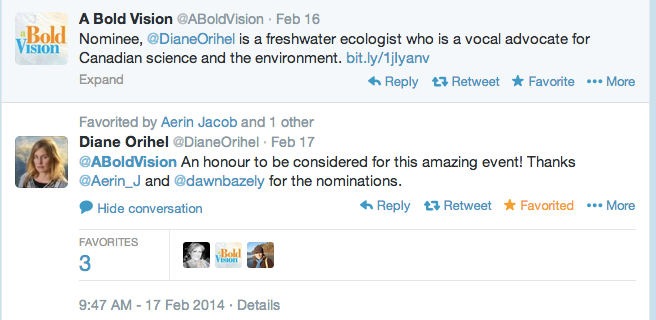This website says that I post a new blog on the 1st & 15th of each month.I should have no excuse, since it's 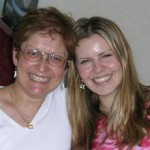 Reading Week and we all have a bit of a breather. Yet, here I am, late again (it's the 17th). The reason is directly related to this post's topic of strong women with a vision. Dr. Adriana Puentes' (long hair, at right) family has been visiting. She did her M.Sc. with me back in 2004-06, before going to a Ph.D. in Uppsala, Sweden.
Reading Week and we all have a bit of a breather. Yet, here I am, late again (it's the 17th). The reason is directly related to this post's topic of strong women with a vision. Dr. Adriana Puentes' (long hair, at right) family has been visiting. She did her M.Sc. with me back in 2004-06, before going to a Ph.D. in Uppsala, Sweden. 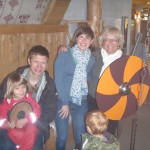 Having her delightful, young (3 & 5) children here over the weekend, reminded me, yet again, of just how tough those early parenting years are, especially for women aiming to be effective mums, and simultaneously keeping the research outputs going. This is difficult even when they have a supportive partner: in Adriana's case, Dr. Gustaf Granath, who is also aiming for an academic career (I'm proud to say, they met in my lab!).
Having her delightful, young (3 & 5) children here over the weekend, reminded me, yet again, of just how tough those early parenting years are, especially for women aiming to be effective mums, and simultaneously keeping the research outputs going. This is difficult even when they have a supportive partner: in Adriana's case, Dr. Gustaf Granath, who is also aiming for an academic career (I'm proud to say, they met in my lab!).
So, although I'm late with this, (as well as my reviews, writing, lecture uploads to Moodle etc. etc.), I hope that my guests had a bit of a break.
I'm posting my other two submitted nominations for the @ABoldVision Conference in Charlottetown PEI, later this year. Both women are academics, one senior and one much more early career: Drs. Sheila Embleton and Diane Orihel respectively. I have tremendous respect and admiration for them, their work ethic, their smarts and their integrity. Like the nomination for Margaret Atwood, these were fun to research and write.
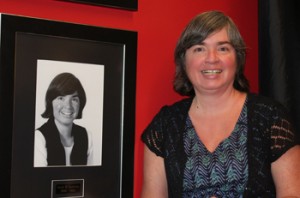 In 100 Words: Sheila Embleton is not hugely famous outside of higher education, but she is internationally known and highly respected in academia. She is a linguistics professor at York University, who has been recognized for her research by the Finnish government. She’s also that very rare creature: a top-flight administrator, who has also managed to maintain a vibrant and active research career. Sheila’s education spans from science to arts: she has degrees in mathematics as well as linguistics/language. As a natural bridge-builder, she has both led and supported many local and international initiatives that create collaborations among students, staff and faculty.
In 100 Words: Sheila Embleton is not hugely famous outside of higher education, but she is internationally known and highly respected in academia. She is a linguistics professor at York University, who has been recognized for her research by the Finnish government. She’s also that very rare creature: a top-flight administrator, who has also managed to maintain a vibrant and active research career. Sheila’s education spans from science to arts: she has degrees in mathematics as well as linguistics/language. As a natural bridge-builder, she has both led and supported many local and international initiatives that create collaborations among students, staff and faculty.
Accomplishments: They are enormous.
In addition to being a highly productive researcher, Professor Embleton has held several senior university administrative positions at York University, including being Vice-President Academic and Provost of York University (2000-09). She has sat and continues to sit on numerous boards, and has chaired and been president of all kinds of councils and organizations, including being Chair of the Ontario Council of Academic Vice-Presidents (OCAV) from 2004-2008.
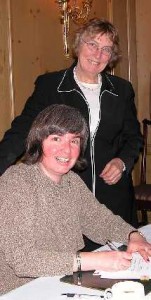 Sheila (at left with Prof. Gill Wu, former Dean of York's Faculty of Science & Engineering) has spent much of the last 20 years providing leadership and support for students and academics from all subjects, both within and outside of York University. Just one example of this is the sabbatical fellowship that she established at Massey College in the University of Toronto, for York University professors who are unable to leave the city to travel abroad or much further afield in Canada, during their sabbaticals, because they have families and cannot leave the city. Sheila is a huge supporter of women both inside and outside of universities. Another example of her work, is that she sits on the board of MITACS, Mathematics of Information Technology and Complex Systems, which has developed diverse programmes to support students and to link them with industry.
Sheila (at left with Prof. Gill Wu, former Dean of York's Faculty of Science & Engineering) has spent much of the last 20 years providing leadership and support for students and academics from all subjects, both within and outside of York University. Just one example of this is the sabbatical fellowship that she established at Massey College in the University of Toronto, for York University professors who are unable to leave the city to travel abroad or much further afield in Canada, during their sabbaticals, because they have families and cannot leave the city. Sheila is a huge supporter of women both inside and outside of universities. Another example of her work, is that she sits on the board of MITACS, Mathematics of Information Technology and Complex Systems, which has developed diverse programmes to support students and to link them with industry.
How will she contribute to a collaborative vision for Canada? From her academic and administrative record, it is obvious that Professor Sheila Embleton is a strong leader. What’s not necessarily clear from her record is just how much of a great listener and team player that she is. While she has held very public leadership positions, Sheila is also very much a “back-room girl (not boy)”! She is not just a front-woman, but also an incredibly hard working person who rolls up her sleeves and does the unglamorous work. Not only will she bring an enormous wealth of experience and accomplishment to the table, particularly in the area of public service and education, but also a track record of mentoring, scaffolding and providing a platform for younger, more junior women to learn and excel in an exemplary, ethical manner. Furthermore, Sheila has developed her philosophy of inclusivity, collaboration and innovation as a board member of York's pan-university, transdisciplinary Institute for the Research and Innovation in Sustainability.
The 3rd nomination that I completed was for Diane Orihel, who's been dubbed the Lady of the Lakes in a Nature article by Canadian science journalist, Hannah Hoag. I'm delighted to say that mine wasn't the only nomination. McGill University Ph.D, student, Aerin Jacob (@Aerin_J) also nominated her! Diane's nomination on the A Bold Vision website, is mainly from Aerin's nomination (so they aren't my words). For the record, here are mine, from my nomination of Diane:
In 100 Words: This extraordinarily brave young woman never set out to be an activist and the face of a public movement to Save the Experimental Lakes Area (ELA) of northern Ontario. Diane received her doctorate from the University of Alberta, under the supervision of Prof. David Schindler.
When the federal government moved to close the ELA, citing the need to save money, Diane became the spokesperson for government scientists, who could not speak publicly.
Her story was written up in Nature, the top science journal in the world, in an article with the title “Lady of the Lakes” (30 October 2013).
Accomplishments: Diane has come a very long way, from a quiet laboratory to being the main spokesperson and activist in Canada on aquatic ecology. She has published extensively in peer-reviewed journals and received a highly competitive NSERC scholarship for her PhD research. She says that she just wants to be a scientist, but she’s achieved very much more than this – the ELA is to be funded by the Ontario Government, which moved forward to pick up the shortfall and the IISD – Institute for International Sustainable Development. While the kinks of the arrangements are being worked out, Diane continues to call for strong government support for science.
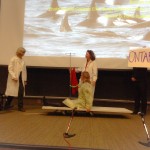 During a recent dinner with Diane, she described to me, how she got activated around the save the ELA campaign, writing, speaking, travelling. She ended up taking time out of her research and she became an expert campaigner. Evidence of her work is all over the Canadian media - numerous panels and talks at universities and in other public venues: Diane is playing the role of the ELA at a University of Toronto event talking about the federal government cuts to Science research, last November. Diane was brought in on a stretcher, and is sitting up after being resuscitated by a transfusion of cash from the Government of Ontario!
During a recent dinner with Diane, she described to me, how she got activated around the save the ELA campaign, writing, speaking, travelling. She ended up taking time out of her research and she became an expert campaigner. Evidence of her work is all over the Canadian media - numerous panels and talks at universities and in other public venues: Diane is playing the role of the ELA at a University of Toronto event talking about the federal government cuts to Science research, last November. Diane was brought in on a stretcher, and is sitting up after being resuscitated by a transfusion of cash from the Government of Ontario!
How will she contribute to a collaborative vision for Canada? What Diane, who is a very quite, reserved person, brings to the table, is the voice of a person whose experience is forged in a very public campaign, in which she was threatened and bullied on several occasions for her actions. She’s a phenomenally brave person. You simply cannot afford to have her absent from this table. Her vision of Canada is one with a healthy environment, strong public science and an open, transparent society.
And there you have it: some of the extraordinary women that I work with, every day. And, all of them have proven themselves to be outstanding leaders.
Dawn Bazely

